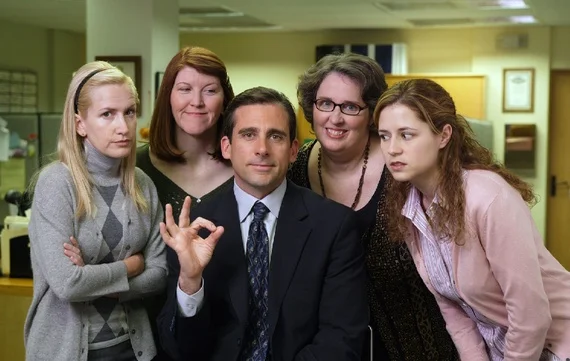Groan-worthy innuendos in the style of Michael Scott came and went—that's what she said—but they taught important lessons about puns and parodies along the way.
It came out of nowhere, slipping into the conversation between dinner and dessert. “That's what she said!” your friend blurted out, before sitting back, satisfied.
At first you didn't get the joke, which he'd recently poached from NBC's sitcom The Office. (This was around 2006, or, if your friend was slow on the uptake, around 2010.) So he explained by example for the rest of the meal. When the waitress asked if you wanted sauce on that, he whispered seductively: “That's what she said,” as if her question was scandalous. Then he giggled like a 12-year-old.
That's what she said, hereafter referred to as TWSS, was the best bad joke of the late 2000s. It forced almost any sentence into unintentional sexual meanings, even when you were just “trying to get in” to the highway's fast lane, or “didn't think it would take so long” in the supermarket line. TWSS was like a bully who stole your lunch money to buy cigarettes. It seized your innocent words and contorted them into indecency.
TWSS actually deserves our thanks. It was a formulaic gag, but it showed us that the most mundane moments still have the potential to shock and surprise. And this is pretty much what sitcoms are for.
TWSS wasn't original, but rather intelligently unoriginal. When NBC adapted The Office from the BBC, it also took up the scepter of sexual wordplay, which happens to date back thousands of years. You can find sexual puns in the poetry of imperial Rome. They're sprinkled liberally in such canonical English texts as Chaucer, Shakespeare, and Joyce. They could literally be called the oldest trick in the book, according to a British researcher of humor named Paul McDonald, who claims the first Anglo-Saxon joke comes from the 11th century Codex Exoniensis:
What hangs at a man's thigh and wants to poke a hole that it has often poked before?
Answer: A key.
This sort of wordplay is classic double entendre, which might not actually make you laugh, but nonetheless prompts a momentary double-take. The first line leads a reader toward an overtly sexual conclusion, but the innocuous answer subverts these expectations. Suddenly the words “poke,” “hole,” and “hangs at a man's thigh” seem to refer to two things at once, one sexual and one innocent.
More HERE Via The Atlantic

